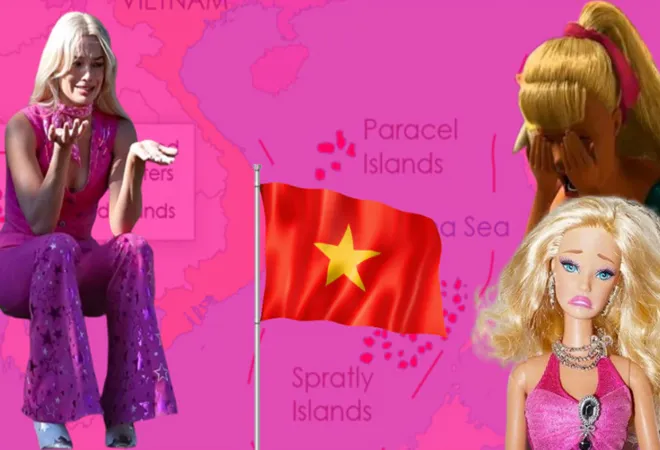-
CENTRES
Progammes & Centres
Location
Repeated use of a particular cartographic version can be perceived as endorsing or legitimising a particular geopolitical stance. This is why Vietnam’s objections are valid.

Early in July, in the middle of energetic global promotions, Hanoi banned the Barbie movie, slated for premiering on 21 July because of a scene featuring a map showing the contentious nine-dash line in the South China Sea. Objections to the map were raised by the Philippines, Brunei, and Taiwan as well. While Manila finally decided to allow screenings with the map being blurred in the scene in question after a board constituted to look into the matter decided that it was a “cartoonish map”, Hanoi banned the movie altogether. The producers, Warner Bros. commented that the map was a child-like drawing with no intended significance.
In 2022, the action-adventure film Uncharted was banned in Vietnam, and in 2021, Netflix pulled down two episodes from the Australian spy drama series Pine Gap after objections from Hanoi and Manila.
Barbie is not the first instance of Hollywood productions landing in geopolitical hot water over the incorrect depiction of the South China Sea region. In 2022, the action-adventure film Uncharted was banned in Vietnam, and in 2021, Netflix pulled down two episodes from the Australian spy drama series Pine Gap after objections from Hanoi and Manila. The 2019 movie Abominable was also not screened in Vietnam for showing the contentious map. While the map shown in the scene is by itself indeed ‘cartoonish’ with distorted shapes barely resembling countries, the depiction of the nine-dash line even on such a map is at once both meaningless as well as disturbing. Soon after the announcement of Vietnam’s ban, Chinese social media erupted in celebration of what was being acknowledged as Warner Bros.’s decision to include the nine-dash line.
Wrongful legitimisation of misrepresented sovereignty through visual entertainment is as much a geopolitical issue as Chinese fishing boats sailing into the sovereign territory of Vietnam or the Philippines even if it is shorn of traditional security implications.
In recent years, several movies and TV shows have encountered significant controversies and faced repercussions for using the contentious nine-dash line map of the South China Sea. The nine-dash line is a demarcation line used by China to claim vast territorial rights over almost the entire South China Sea. This claim is disputed by several countries in the region, including Vietnam, the Philippines, Malaysia, Brunei, and Taiwan, leading to political sensitivities and tensions. Beijing has systematically and aggressively made maritime territorial advances that are in direct contravention of maritime territorial limits as set by the UNCLOS, and disregarded the ruling of the Permanent Court of Arbitration which upheld sovereign rights of the Philippines over the extent of its maritime area in the South China Sea and published maps which show the entirety of the South China Sea as its own territory delimited by the nine-dash line.
The nine-dash line is a demarcation line used by China to claim vast territorial rights over almost the entire South China Sea.
What is definitely strange is that China’s cartographic version of the South China Sea appears to be the only version that many producers use despite repeated objections. Complaints regarding depictions of the nine-dash line in the South China Sea draw from the established tenets of international law and the rules-based order and are not solely of a moral, cultural, or religious nature which most objections to performing arts tend to generally be.
The objections are valid because despite these being only movies and TV shows with little to no apparent relation with geostrategic imperatives, the use of the nine-dash line has been seen as endorsing China's territorial claims over the South China Sea, in direct contradiction to the claims of other countries in the region and most importantly, international maritime law. Repeated instances of the use of a particular cartographic version can therefore be perceived as endorsing or legitimising a particular geopolitical stance. Maps are vital tools for establishing sovereign territorial delimitations. And this is why Vietnam’s objections and complaints raised by other countries are not only valid but also must be done as many times as the instances of infringement.
Till 2022, China had for some years been the biggest box office market by revenue globally and was overtaken by the US only recently in 2023. For Warner Bros., Dreamworks, Sony, and many other US production houses therefore China is a huge market. But in addition to being a lucrative market for visual entertainment, China has, for years, been decision-making in Hollywood by offering to finance and even buy theatre chains in the country. And as these production houses rely more and more on China to make money, it is not surprising that China is too big to ignore. But what is really alarming is the extent to which China has been able to bend, reshape and dictate terms to suit the worldview that it wants to project.
Repeated instances of the use of a particular cartographic version can therefore be perceived as endorsing or legitimising a particular geopolitical stance.
For Beijing, everything is political. When it comes to questions of sovereignty, it is natural for almost every country to be political. But where China differs from other countries is that doing business with China comes at a huge cost and often that cost goes beyond numbers. There are several instances of Beijing punishing studios for productions with content that go against what the Chinese Communist Party want their viewers to see and even changing entire scripts to portray the country not as a dictatorship but as a benevolent one. Despite having been dethroned as the number one box office market this year, it is still the second-largest one and will continue to have sway over what is shown and how it is shown. Maps showing the nine-dash line, therefore, are not significant enough at all to take cognisance of. Barbie will not be the last production to contain China’s version of political, cultural, and strategic messaging.
Pratnashree Basu is an Associate Fellow at Observer Research Foundation
The views expressed above belong to the author(s). ORF research and analyses now available on Telegram! Click here to access our curated content — blogs, longforms and interviews.

Pratnashree Basu is an Associate Fellow, Indo-Pacific at Observer Research Foundation, Kolkata, with the Strategic Studies Programme and the Centre for New Economic Diplomacy. She ...
Read More +